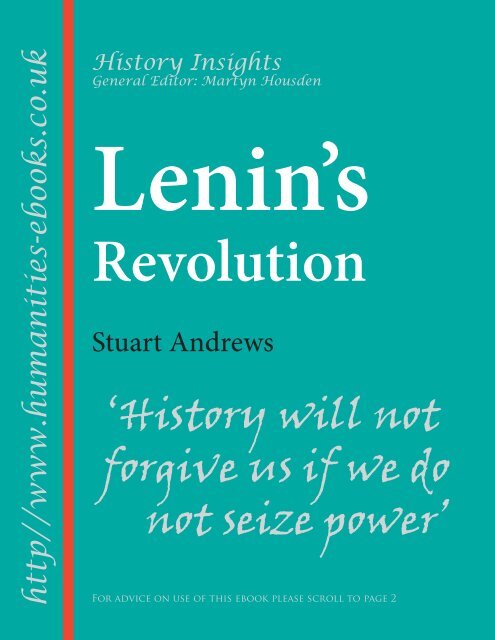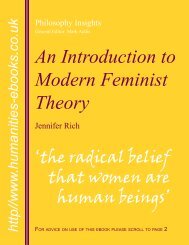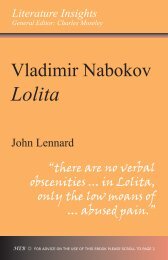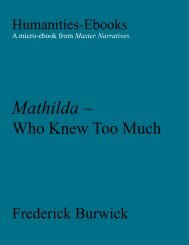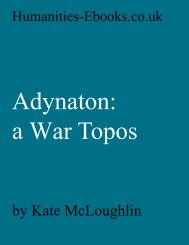Lenin's Revolution - Humanities-Ebooks
Lenin's Revolution - Humanities-Ebooks
Lenin's Revolution - Humanities-Ebooks
You also want an ePaper? Increase the reach of your titles
YUMPU automatically turns print PDFs into web optimized ePapers that Google loves.
Running Head 1<br />
http//www.humanities-ebooks.co.uk<br />
History Insights<br />
General Editor: Martyn Housden<br />
Lenin’s<br />
<strong>Revolution</strong><br />
Stuart Andrews<br />
‘History will not<br />
forgive us if we do<br />
not seize power’<br />
For advice on use of this ebook please scroll to page 2
Publication Data<br />
© Stuart Andrews, 2007<br />
The Author has asserted his right to be identified as the author of this Work<br />
in accordance with the Copyright, Designs and Patents Act 1988.<br />
Published by <strong>Humanities</strong>-<strong>Ebooks</strong>.co.uk<br />
Tirril Hall, Tirril, Penrith CA10 2JE<br />
Reading Options<br />
* This book is designed to be read in single page view, using the ‘fit<br />
page’ command.<br />
* To navigate through the contents use the hyperlinked ‘Bookmarks’ at<br />
the left of the screen.<br />
* To search, click the magnifying glass symbol and select ‘show all results’.<br />
* For ease of reading, use to enlarge the page to full screen,<br />
and return to normal view using < Esc >.<br />
* Hyperlinks (if any) appear in Blue Underlined Text.<br />
* For a computer generated reading go < View > < Read out Loud >.<br />
Licence and permissions<br />
By purchasing this book you are licensed to read this work on-screen. No<br />
part of this publication may be otherwise reproduced or transmitted or distributed<br />
without the prior written permission of both the copyright owner and<br />
the publisher. Making or distributing copies of this book constitutes copyright<br />
infringement and would be liable to prosecution. Thank you for respecting the<br />
rights of the author. You may print one copy of the book for your own use but<br />
copy and paste functions are disabled.<br />
ISBN 978-1-84760-054-7
Lenin’s <strong>Revolution</strong><br />
Stuart Andrews<br />
History Insights ☼ <strong>Humanities</strong>-<strong>Ebooks</strong>
Contents<br />
About the author<br />
Preface<br />
BACKGROUND<br />
1.1 The Communist Manifesto<br />
1.2 Student revolutionaries<br />
1.3 Lenin’s early Marxism<br />
Chapter 2 The Making of a Bolshevik<br />
2.1 Prison and exile<br />
2.2 <strong>Revolution</strong> by journalism<br />
2.3 Bolsheviks and Mensheviks<br />
2.4 Russian Robespierre?<br />
Chapter 3 Dress Rehearsal 1904–1907<br />
3.1 ‘Bloody Sunday’<br />
3.2 Organising for revolution<br />
3.3 Potemkin Mutiny<br />
3.4 Fourth Congress (1906)<br />
3.5 Lenin and the Duma<br />
LENIN’S 1917<br />
Chapter 4 Visions in Exile: 1908−1916<br />
4.1 Bolshevik disagreements<br />
4.2 Defining the Party line<br />
4.3 Malinovsky—secret agent<br />
4.4 International perspectives<br />
4.5 Opposing patriotism<br />
4.6 Redefining capitalism
Lenin’s <strong>Revolution</strong> 5<br />
Chapter 5 1917: February <strong>Revolution</strong><br />
5.1 Absentee revolutionary<br />
5.2 Duma and Soviet<br />
5.3 Leaving Switzerland<br />
5.4 Letters from Afar<br />
5.5 The Finland Station<br />
Chapter 6 1917: Towards October<br />
6.1 ‘April Theses’<br />
6.2 ‘All power to the Soviets’<br />
6.3 July Days<br />
6.4 Kornilov<br />
6.5 ‘History will not forgive us’<br />
6.6 Relying on Trotsky<br />
Chapter 7 Shaping the <strong>Revolution</strong><br />
7.1 Armed vanguard<br />
7.2 Towards Brest-Litovsk<br />
7.3 Constituent Assembly<br />
7.4 Saving the <strong>Revolution</strong><br />
ASSESSMENT<br />
Chapter 8 Leninist legacy<br />
8.1 Tradition of Terror<br />
8.2 Red Army<br />
8.3 New Economic Policy: reversing priorities<br />
8.4 Revival of bureaucracy<br />
8.5 One-party government<br />
8.6 Communism: home and abroad.<br />
8.7 Government by propaganda<br />
ADDENDA<br />
Lenin’s <strong>Revolution</strong>aries: a checklist<br />
Guidance on further study: critical bibliography
About the author<br />
Stuart Andrews is now Librarian of Wells & Mendip Museum, UK, after<br />
more than 30 years of teaching. His special interest is the way in which<br />
slogans, ‘spin’ and full-blooded propaganda—rather than historical reality—shape<br />
public perceptions of events. Among his recent publications<br />
on this theme are The British Periodical Press and the French <strong>Revolution</strong>,<br />
1789–99 (Palgrave/Macmillan, 2000) and Irish Rebellion: Protestant polemic<br />
1798–1900 (Palgrave/Macmillan, 2006). He now focuses on the role<br />
of slogan-making in the Bolshevik <strong>Revolution</strong>. Political theorists (he concedes)<br />
may not themselves orchestrate revolution, but they can provide a<br />
ready-made vocabulary with which to justify it.
Preface<br />
What has become of Lenin’s Russia? What is his relevance in a world where ‘Leningrad’<br />
has reverted to ‘St Petersburg’; where President Yeltsin re-builds Moscow’s Cathedral<br />
of Christ the Saviour; and where President Putin attends the Christmas Eucharist of<br />
the Orthodox Church, and commends a religion which ‘unites everyone on the basis<br />
of traditional moral values and strengthens the moral principles of society’? Much<br />
has changed, but Lenin remains important because the Russian <strong>Revolution</strong>, no less<br />
than the French <strong>Revolution</strong>, has shaped the modern world. My twenty-first century<br />
account attempts to view Lenin from a post-1989 perspective. It is written for a<br />
Europe without the Berlin Wall, and without the USSR. It adopts a largely narrative<br />
approach because in revolutions one thing leads to another—and often in unexpected<br />
ways. Lenin himself, as Robert Service remarks, was ‘unexpected’. James Maxton,<br />
an earlier biographer of Lenin, spelt out this unexpectedness: ‘He was a plain man<br />
who had appeared out of obscurity to meet a need felt keenly by 150 millions of<br />
people in the armies of Russia, in the factories and streets of Moscow and Petrograd<br />
and in the thousands of villages scattered over the vast plains of Russia.’ Modern<br />
scholars focus on those 150 millions—‘the revolution from below’—reflected in the<br />
title of Orlando Figes’s A People’s Tragedy (1996). But this study returns the focus to<br />
the revolution’s leader.<br />
Lenin did not conjure up the grievances of workers, soldiers and peasants that<br />
made the Bolshevik’s bloodless October coup possible, but he did express the grievances,<br />
and prescribe remedies, in slogans that made sense to the masses—or at least<br />
to the local activists who motivated them. Besides emphasizing the extraordinary<br />
phenomenon of Lenin’s practical political achievements, my study focuses on the<br />
persuasive gloss which his writings place on every unexpected turn of events. So there<br />
are frequent references to the Collected Works and to the 1917 writings extracted by<br />
Slavoj Zizek in <strong>Revolution</strong> at the Gates (2002).<br />
For the narrative I have drawn widely on pre-1989 historians, but of course the<br />
text makes extensive use of recent scholarship, particularly the two following historiographical<br />
studies: Critical Compendium to the Russian <strong>Revolution</strong> edited by Edward
Lenin’s <strong>Revolution</strong> 8<br />
Acton (1997) and Reinterpreting <strong>Revolution</strong>ary Russia edited by Ian Thatcher (2006).<br />
Other printed sources are indicated parenthetically in the text—with full bibliographical<br />
details provided in ‘Guidance on further study’.<br />
Dates are given as in the modern calendar, though ‘February <strong>Revolution</strong>’ and<br />
‘October <strong>Revolution</strong>’ are retained. Transliteration of Russian names follows the style<br />
of Acton’s Critical Compendium except for using ‘y’ rather than ‘ii’ for final endings<br />
of surnames. Full names of the various brands of revolutionary socialists featured in<br />
Lenin’s <strong>Revolution</strong> are listed separately.
Chapter 1 Fifty Years of Marxism<br />
1.1 The Communist Manifesto<br />
Not the least of the paradoxes implicit in Lenin’s Bolshevik <strong>Revolution</strong> is its apparently<br />
un-Marxist character. Karl Marx’s revolutionary model had been formulated<br />
by analogy with the dialectical method of classical Greek and medieval philosophy<br />
for conducting oral debate. The dialectical form of disputation proceeded from major<br />
premise (thesis) through minor premise (antithesis) to conclusion (synthesis). Marx<br />
followed Hegel in applying the dialectical form to the actual unfolding of history<br />
(Wilson, pp. 179−198). For Marx, the bourgeoisie (thesis) opposed by the proletariat<br />
(antithesis) leads to the classless society (synthesis). The first section of the<br />
Communist Manifesto, headed ‘Bourgeois and Proletarian’, begins: ‘The history of<br />
all hitherto existing society is the history of class struggles’ (Communist Manifesto,<br />
p. 79).<br />
The assumptions of the Manifesto reflect its origins. Written by Marx in 1847 and<br />
published in German in London in February 1848, it was backed by evidence drawn<br />
by Friedrich Engels from the commissions of inquiry into conditions of employment<br />
in towns and factories of contemporary England⎯the most highly industrialized<br />
country of its day. Ever since the enfranchisement of the middle classes by the 1832<br />
Reform Act it had been easy to trace the fault lines in British society, as reflected in a<br />
House of Commons increasingly representative of the commercial and manufacturing<br />
interests, and an Upper House of large landowners. In 1848 it was hardly accurate<br />
to claim that in Britain ‘the executive of the modern State is but a committee of the<br />
common affairs of the whole bourgeoisie.’ The English landed interest did not surrender<br />
power so easily. But the rapid industrialization of Britain did seem to confirm<br />
the Marxist gibe that ‘the need of a constantly expanding market for its products<br />
chases the bourgeoisie over the whole face of the globe.’ And it was certainly true of<br />
England that ‘with the development of industry the proletariat not only increases in<br />
number, it becomes concentrated in greater masses’ (Manifesto, pp. 82–3, 89).<br />
The ‘immediate plan of the Communists’ is defined as ‘formation of the proletariat<br />
into a class, overthrow of the bourgeois supremacy, conquest of political power by
Lenin’s <strong>Revolution</strong> 10<br />
the proletariat’(Manifesto, p. 95). This assumes that the revolution will be an urban<br />
revolution of industrial workers. Yet Lenin’s revolution took place in a country where<br />
most of the population were peasants. Marx’s so-called ‘Dialectical Materialism’<br />
implies a connection between the dialectical model of historical development and<br />
its purely economic motivation, And when considering how far Lenin’s revolution<br />
conforms to the Marxist pattern, we must measure the Bolshevik achievement against<br />
the Manifesto’s practical programme—which Marx thinks will be ‘pretty generally<br />
applicable’. It includes: abolition of private landed property and all rights of inheritance;<br />
a graduated income tax; nationalization of banks, communications and transport;<br />
increased numbers of state-owned factories; cultivation of waste lands; equal<br />
liability of all to labour, and the establishment of ‘industrial armies’; combination of<br />
agriculture and manufacturing industry leading to the ‘gradual abolition of town and<br />
country’; free education for children in state schools and abolition of child labour in<br />
factories (Manifesto, pp. 104−5).<br />
The spread of Marxist ideas in Europe during the second half of the nineteenth<br />
century can be charted in prefaces to successive editions of the Manifesto. In 1872<br />
its authors could claim that the Manifesto had been republished in Germany at least<br />
12 times since 1848. Now, writing after the Paris Commune, ‘where the proletariat<br />
for the first time held political power for two whole months’, Marx and Engels drew<br />
the lesson that ‘the working class cannot simply lay hold of the ready-made State<br />
machinery’. In 1872 a Russian edition of Marx’s Capital appeared⎯the first non-<br />
German edition to be published. The Manifesto, translated by Bakunin, had appeared<br />
in Russia in the 1860, but it was then (as the preface to the 1882 Russian edition conceded)<br />
‘only a literary curiosity’. The 1882 preface, written just after the assassination<br />
of Tsar Alexander II and two decades after the abolition of serfdom, does express<br />
some uncertainty about the revolutionary role of the Russian peasantry. Could the<br />
peasants’ form of ‘primeval common ownership of land pass directly to the higher<br />
form of Communist common ownership?’ Marx and Engels cautiously conclude: ‘If<br />
the Russian <strong>Revolution</strong> becomes the signal for a proletarian revolution in the West,<br />
so that both complement each other, the present Russian common ownership of land<br />
may serve as the starting point for a communist development’ (Manifesto, pp. 53–4,<br />
56).<br />
Equally instructive for assessing Lenin’s <strong>Revolution</strong> is the preface to the 1892<br />
Polish edition, which draws a contrast between Polish and Russian industrial development.<br />
Noting a ‘decided progress of Polish industry’, Engels observes: ‘Russian<br />
Poland, Congress Poland, has become the big industrial region of the Russian Empire.
Is this sample what you are looking for?<br />
If so, please browse our lists<br />
or look for different formats at:<br />
http://www.humanities-ebooks.co.uk<br />
or buy this PDF book<br />
HERE<br />
About <strong>Humanities</strong> <strong>Ebooks</strong><br />
<strong>Humanities</strong>-<strong>Ebooks</strong> is an an authors’ co-operative, not a commercial publisher.<br />
Our aim is to produce inexpensive, high quality <strong>Ebooks</strong>, and to pass the maximum<br />
possible proportion of the purchase price to their authors.<br />
Almost all our titles are available in Kindle format, though for academic books<br />
and those with complex layout the PDF is almost invariably superior.<br />
All our titles can be ordered by libaries through Ebrary, EBSCO and MyiLibrary.<br />
Paperback versions of many of our titles can be reached via the book descriptions<br />
on our website.


